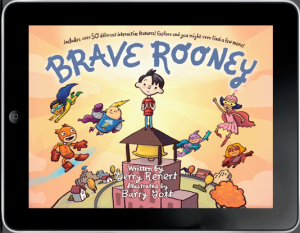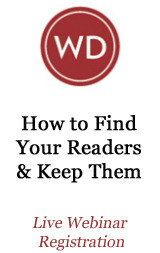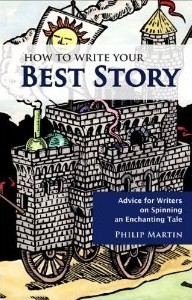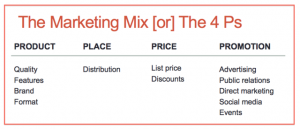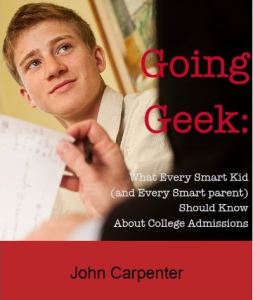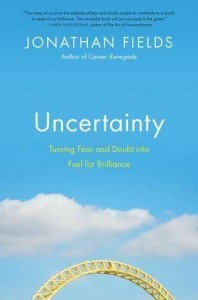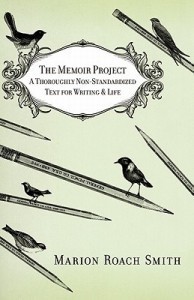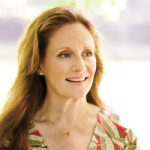Jane Friedman's Blog: Jane Friedman, page 204
September 30, 2011
What Advertising Can Teach a Children's Writer
Today's guest post is from Gerry Renert, a three-time EMMY nominated kid's writer, who has recently become a published children's book author.
I never thought I'd end up writing children's books, especially when my first paying writing job was creating print ads to convince upper-crusters they needed a certain brand of scotch to announce their arrival into upper-crustdom. Looking back, though, the advertising job wasn't a curse but more a blessing in the eventual outcome of my writing career.
Advertising taught me some lessons I'll never forget.
First, it taught me how to relate words to picture—either directly or, better yet, indirectly, sometimes with a fun twist of irony or an off-beat juxtaposition. Second, it taught me how to convey a message or feeling in as few words as possible.
In 2009, after a stint in children's animated TV as a writer/creator and executive producer, I decided to take a crack at writing a children's book.
A good children's book is the perfect melding of short verbal communications that play off of or reinforce marvelous visuals. That special combination is the exact dynamic that makes for a smart, attention-getting print ad.
When my first book editor told me to keep my manuscript short and simple, and let the words interact with the visuals rather than just describe them, I didn't look at her blank faced. In fact, I looked at her much like I would look at a good advertising creative director who knew what it took to communicate something with excitement, while keeping it on-message.
My first children's book, Nathan Saves Summer, was published in 2010 and has been successful enough to warrant a second book in the series. Recently I released a digital book/app, Brave Rooney, which tells the story of a normal boy who somehow finds himself in an elementary school for superhero kids.
In creating the app, I worked very closely with the illustrator, just as I would have with any advertising art director, to be certain the association between words and picture had a special spark. My experience in animated TV came in handy in working with the digital developer, and I watched closely how the added elements of interactivity made the connection between the reader and the story stronger than anything one of my advertising clients could've imagined. Brave Rooney is the best thing I've ever written, and I'm pretty sure my first advertising creative director would have been proud, too.
Back to the blessing/curse thing: I don't look at writing advertising copy as either one, but as a good stepping stone that any young writer should jump on. Accept it as a truly creative form of writing and leave the scotch to the overly dramatic, tortured writers.
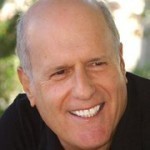 Gerry Renert is a three-time Emmy nominated TV series creator/exec producer and marketing professional with over 14 years of experience in children's television, book publishing and merchandise licensing. He has direct experience in turning unknown properties and characters into viable, international brands.
Gerry Renert is a three-time Emmy nominated TV series creator/exec producer and marketing professional with over 14 years of experience in children's television, book publishing and merchandise licensing. He has direct experience in turning unknown properties and characters into viable, international brands.

September 29, 2011
Writing on the Ether
C'mon baby, light my Kindle Fire. And watch out for sparks from certain NOOKs in crannied marketplaces. Beware bald guys bearing 3Gifts. Silk, Bezosense, and smell that? It's the lighter fluid of Android aspirationals yearning to be treed like iPads for Christmas. It's beginning to look a lot like Amazon.
#bbpBox_119057323443486720 a { text-decoration:none; color:#0084B4; }#bbpBox_119057323443486720 a:hover { text-decoration:underline; }Jeff just introduced a full-color, touchscreen Kindle for movies, music, apps, games, reading & more. Meet Kindle Fire![image error]about 18 hours ago via web Reply Retweet Favorite Kindle Team
"One after another, like moths to a flame, technology companies have been seduced into entering the market for tablets…A competition between Amazon and Apple tablets will be a battle that pits the company that created the first popular e-reader (and set off a still-unfolding revolution in how books are consumed) against the company that created the first popular tablet (and set off a revolution in progress about how entertainment and other media are consumed)."
—David Streitfield of the New York Times via CNBC eyeballs:
Amazon's High Hopes for Its iPad Competitor
#bbpBox_119061318052487168 a { text-decoration:none; color:#FF3300; }#bbpBox_119061318052487168 a:hover { text-decoration:underline; }Kindle Fire seems impressive, but worth noting Amazon's continued commitment to E-Ink and dedicated reading devices. #notzerosum #dbw[image error]about 18 hours ago via HootSuite Reply Retweet Favorite Guy L. Gonzalez
"Bezos made the following claim: "From Kindle, Fire is born." At the risk of extending this analogy too far, Bezos is now frantically fanning a brush-fire that looks like it might burn up its competitors and put publishers at risk of third-degree burns."
—Philip Jones sees smoke in Three new Kindles and a Kindle Fire
"B&N is going to be feeling the heat as these are compelling e-ink reader prices (per Mashable their stock dropped 9% after Amazon's announcement), Apple is going to be feeling some pressure as there is finally a viable device that undercuts the iPad on price, and having now crossed that magical sub-$100 price point, methinks this is going to be a huge holiday season for e-readers."
—Nathan Bransford in Amazon Kindles an Ebook Fire
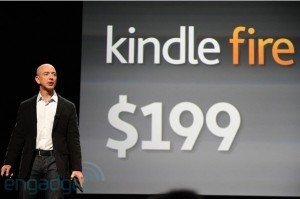
Photo from engadget's coverage of Amazon's newser.
"10:53AM So, it's Fire for $199, Touch 3G for $149, Touch for $99, and Kindle for $79."
—Tim Stevens of engadget blogging
Live from Amazon's tablet event
"Clearly, Amazon's just-announced Kindle Fire isn't designed to compete head-to-head with the iPad 2 on specs alone, but that doesn't mean consumers won't be cross-shopping the two this holiday season."
—Chris Ziegler's Amazon Kindle Fire vs. iPad vs. Nook Color: by the numbers
"Amazon Silk acts as an intermediary between your mobile device (the Kindle Fire) and the Internet at large. As you make a request—go to TheAwl.com—Silk jumps in and distributes the workload of finding, downloading, and presenting that information on the device."
—Alexis Madrigal asks Will Amazon Silk Actually Be Better Than Other Web Browsers?
#bbpBox_119060351080861696 a { text-decoration:none; color:#009999; }#bbpBox_119060351080861696 a:hover { text-decoration:underline; }This Amazon Silk nonsense had better be webkit-based, dammit.[image error]about 18 hours ago via Twitter for MacReplyRetweetFavoritePablo Defendini
After Fire comes the iceberg
"A year ago, Robert Gottleib of Trident Media announced that agents shouldn't become publishers. This week he announced that Trident Media was opening Trident E-Book operations. Which will help Trident's authors self-publish. … I suggested the radical concept, a while back, of publishers granting the authors the rights to backlist in return for reverse royalties of 25%. What this means is the author gets to do what they want with the titles, but on what they earn, they pay the publisher a royalty of 25% for that."
—Bob Mayer is the one in the life preserver as
The Perfect Storm is Looming in Publishing
"Today I will add another urgent suggestion to general trade publishers: reconsider your commitments to publish illustrated books in any time frame more extended than a year or two and think about sticking to straight text, unless you have paths to the customers for those books that do not go through bookstores. If we do end up in an 80% ebook world anytime soon, and we very well might, you'll want to own the content you know works (for the consumer) in that format, not what you don't know works any way other than in print."
—Mike Shatzkin, our weekly Ether Elder, takes stock at
Four years into the ebook revolution: things we know and things we don't know
Mike Shatzkin and Michael Cader organized a Publishers Launch one-day conference in New York this week, Ebooks for Everyone Else. Its hashtag was #plcny, and its Twitterati were busy.
#bbpBox_118445164774699008 a { text-decoration:none; color:#088253; }#bbpBox_118445164774699008 a:hover { text-decoration:underline; }Pub Market conference confirms many more people writing "books" than reading/buying them. Proceed with caution. #plcny[image error]September 26, 2011 6:01 pm via web Reply Retweet Favorite Strothman Agency
"According to the Association of American Publishers, total gross sales for all books in 2010, as reported by 87 publishers, were about $15.6 billion, an increase of around 2.7 percent over 2009. CD audiobooks represented $189.7 million of that total, a drop of 11 percent. But the increase in download sales to $81.9 million was a boost of 38.8 percent, reflecting the shift toward digital audio, a trend that from all accounts has continued in 2011."
—Peter Osnos is listening for The Coming Audiobooks Boom
#bbpBox_118427187249545216 a { text-decoration:none; color:#0084B4; }#bbpBox_118427187249545216 a:hover { text-decoration:underline; }#plcny Shatzkin: authors will gravitate to bigger agencies that have digital capabilities, there will be agency consolidation.[image error]September 26, 2011 4:50 pm via TweetDeckReplyRetweetFavoriteEmily Williams
"So how many bestsellers have been rejected by reputable agents? Probably something like, all of them. How many agents have rejected books that went on to become bestsellers? Probably a quite a few. Do we ever kick ourselves over it? Maybe sometimes, but mostly we just keep moving."
—Rachelle Gardner on the move in Missing Out on a Bestseller
#bbpBox_118354097601646592 a { text-decoration:none; color:#0084B4; }#bbpBox_118354097601646592 a:hover { text-decoration:underline; }#plcny "What time do your followers pay attention? When do you get the most retweets?" Iris Blasi says. (I hope it's not at 8:15 like hers!)[image error]September 26, 2011 11:59 am via Twitter for iPhoneReplyRetweetFavoriteShana Cohen
"My bias toward late starters—people who have lived a whole life, or two, or three before seriously devoting themselves to write a book—relates to the collision of life and art; I'm interested in writers who perhaps had the inkling, or the deep desire, to write, to pursue a creative life, for a long time, but for myriad reasons were impeded—internally, externally, a combination of the two. "
—Sonya Chung announces a new feature at The Millions on
Post-40 Bloomers: "Late" According to Whom?
#bbpBox_118417710546825217 a { text-decoration:none; color:#1F98C7; }#bbpBox_118417710546825217 a:hover { text-decoration:underline; }Ok so it is official. Authors in driver seat in publishing. Everyone else riding without seat belts.#plcny[image error]September 26, 2011 4:12 pm via TweetDeck Reply Retweet Favorite carolynpittis
"The biggest problem, according to librarian Buffy Hamilton, author of the Unquiet Librarian blog, is DRM. Digital Rights Management is what restricts content from being shared across devices. It means that e-books from Amazon can't be read on Nooks, and e-books from Barnes & Noble won't work on Kindles. It means, oftentimes, that kids can't bring their own devices from home to use for library check-outs."
—Audrey Watters watches as School Libraries Struggle With Ebook Loans
Howling for how-to's
"There were hidden dangers that made no sense, like the producer who wanted to see "more stuff" in the script but couldn't define what that meant. Occasionally things got really murky, like when one producer told me one thing and his partner then completely contradicted him. No one saw that as a problem.
—Martha Carr in a cameo role in The Legend of the Movie Option
" I often see the most weakness in authors' key selling points; some people have a hard time getting past "Buy my book!" You'll have to be more imaginative than that to catch a stranger's attention!"
—Jane Friedman at Writer Unboxed goes down A Checklist for Marketing Your E-Book
"Like Victoria with her cherished but too-detailed lady, I examine whether the ruffles are telling details or discardable darlings. Whether the sensually rippled leather gloves are too distracting. And what I need to make each adapted part fit seamlessly together. If you do this stage of the editing right, every letter of your prose works as hard as it can."
—Roz Morris riffs on Victoria Mixon's design parable in
The power of suggestion—what can you leave the reader to fill in?
Social Media City
"At its core, social media is really the art of the tease. It's all about clever headlines and good timing. Sure, you could walk out on stage shouting into a megaphone about how great you are. But if you take off a single glove in just the right way, you might find a lot more people sticking around for the rest of the show. "
—Iris Blasi in Social Media: The Art of the Nudge
(Blasi's full article will be available soon; we'll nudge you when it has a home)
#bbpBox_118346104449400832 a { text-decoration:none; color:#0084B4; }#bbpBox_118346104449400832 a:hover { text-decoration:underline; }@September 26, 2011 11:28 am via webReplyRetweetFavoriteIris Blasi
"When a website has a midlife crisis, it doesn't buy a Porsche. It tries to become TV … There's a point where a site steps away from writing to such an extent that they leave that space entirely vacant—waiting for another site to occupy it. The Awl follows Gawker, perhaps, or G follows Facebook? Not sure those are the right analogies, but I do know that when sites cross over into that place where writing is instrumental and incidental, I stay behind and probably always will."
—Jim Hanas tunes in to The Gawkerization of Facebook
"If Twitter hopes to grow at the pace of Facebook, it will have to figure out how to stop thinking in @ symbols, and start thinking like my sister."
—Nick Bilton assesses Why Facebook Works for All, Twitter for Some
"The Internet is changing the economics of attention by fostering peer-to-peer interactions. People used to pay attention to those around them and to 'stars.' Now, they spend lots of time online paying attention to people they haven't met. And, increasingly, individuals go online to get attention, not to give it."
—Esther Dyson writes that online, Attention Must Be Paid
"Our computers drive your car better than you do when you're drunk," Mr. Schmidt said.
"Or when you're 16 or when you're old," Mr. Page said. "You'll get a software update and your car will be safe, which is great."
—Claire Cain Miller at the Zeitgeist confab hears that Google's Biggest Threat Is Google
T-shaped ad people in their "circle of momentum"
"You have to live in beta, constantly evolving and staying flexible enough to solve whatever challenges are front and center. But beyond that you need new teams of T-shaped people: folks who have a deep expertise but can think and interact across disciplines. … To win takes talent. Talent only comes if there are opportunities for great work. Opportunities come from clients. Attracting them calls for visibility and evidence of what you can do. That only results from work itself. Which, of course, requires talent. This is the circle of momentum. It needs jolts of energy at all five key points."
—Edward Boches in Great questions for the advertising industry: Part 1, Part 2
Springtime for used car salesmen
"Only one-quarter of those surveyed say news orgs get the facts right, a new low since 1985 when the question was first asked. Two-thirds (66 percent) say stories are often inaccurate, a new high. And nearly three-quarters of Americans believe that journalists try to cover up their mistakes, rather than admit them."
—Julie Moos on the Pew Research Center's finding that
75% of Americans say journalists can't get their facts straight
#bbpBox_119108120810233856 a { text-decoration:none; color:#2FC2EF; }#bbpBox_119108120810233856 a:hover { text-decoration:underline; }Just got word of another top-notch editor heading to Amazon Publishing. The great migration continues apace.[image error]about 15 hours ago via web Reply Retweet Favorite Jason Allen Ashlock
Both pluses and minuses are in the nature of things
"It's possible to admire Mr. Greenblatt's book while wishing it contained more of the boldness and weirdness he admires in Lucretius. Mr. Greenblatt's prose, charted on a Geiger counter, would register mostly a state-of-the-art air-conditioner's steady hum. I found myself longing for a few more unsettling spikes of intellect and feeling. You won't be bored by 'The Swerve'; neither will you be on the edge of your seat."
—Dwight Garner reviews Stephen Greenblatt's "The Swerve: How the World Became Modern" in:
An Unearthed Treasure That Changed Things
#bbpBox_118430607679303680 a { text-decoration:none; color:#0084B4; }#bbpBox_118430607679303680 a:hover { text-decoration:underline; }Sorry, this boat has sailed: "Just because anything can be published doesn't mean everything should be published." #plcny[image error]September 26, 2011 5:03 pm via TweetDeck Reply Retweet Favorite Peter Turner
 Porter Anderson is a Fellow with the National Critics Institute, and a senior producer and consultant formerly with the United Nations World Food Programme in Rome and INDEX: Design to Improve Life in Copenhagen. As a journalist, he has worked with media including CNN, the Village Voice, and the Dallas Times Herald. He's based in Tamp
Porter Anderson is a Fellow with the National Critics Institute, and a senior producer and consultant formerly with the United Nations World Food Programme in Rome and INDEX: Design to Improve Life in Copenhagen. As a journalist, he has worked with media including CNN, the Village Voice, and the Dallas Times Herald. He's based in Tamp

September 28, 2011
The No. 1 Ability of The Empowered Author
There are many qualities of successful authors. But I think empowered authors have one ability that makes them more dynamic, effective, and desirable to potential publishing partners.
It's an ability to directly connect with an audience.
This Thursday, I'm teaching an online class about how to find and develop your readership. The more you're able to find and engage with your audience, the stronger your overall position, no matter what kind of book or project you launch.
What does it take to do this?
Time
Energy
Patience
A little online savvy
Mostly: creativity and imagination
Yes, interacting with your readers does take time away from your writing. But it's an investment in the long-term future of your career. It's an investment in word of mouth for your next project. It's like putting money in the bank.
Just as a company might analyze its "purchase" funnel, you should think about the different ways you touch potential readers and core fans. For instance, here's what my funnel looks like:
I reach strangers (potential readers) mostly through Twitter, search engines, and events. My evangelists also spread the word to their audiences.
I reach a casually interested audience (and sometimes strangers) through this blog, Facebook, Google Plus, and LinkedIn.
I reach my dedicated audience through people who subscribe to this blog via RSS and e-mail.
I consider true fans to be e-mail newsletter subscribers and buyers of my e-book on The Future of Publishing .
Do you know what your funnel looks like? Do you have one? If you want to learn more about audience development, click here to read more about my class this Thursday. It costs $79 to register. Perks include:
A full year of access to the recording of the session
The ability to ask me any questions you like (no question goes unanswered)
Hope to see you there.

September 27, 2011
What Is a Story?
The following is excerpted from How to Write Your Best Story by Philip Martin. It may seem to address a simplistic question, but I must agree with Steven Spielberg when he said, "People have forgotten how to tell a story." So I hope you won't be too proud to remind yourself what storytelling is all about.
A writer, said Isaac Bashevis Singer, is basically a storyteller. But what is a story?
According to Randall Jarrell, a story is first of all a chain of events that begins at one place and ends at another "without any essential interruption."
Mark Twain agreed. His first rule of writing was "that a tale shall accomplish something and arrive somewhere."
So, a story goes somewhere. It follows, with purpose, one or more characters through a series of events. By the end, it arrives at a target destination, fulfilling its reason for having been told.
If the string of events is fairly neutral and straight-forward, we might call it a narrative. A narrative might not be more than a sequence of things that happened, one after the next.
I did this. Then I did this. Then this happened.
If a narrative is basically what happened, a story takes it to the next level. It creates a structure to seek and hold far more significance.
Story Leads to Meaning
When a story takes shape, we've taken that string of events and invested it with meaning. What was important enough to shape into a story … and to tell others about it?
Story is how—long, long ago—we learned to take the confusing flow of many things that happen and try to make sense of them. A story is a fundamental way that humans organize and store information.
We do this whether or not such meaning actually existed on its own. Regardless, we shape it, through our selection of elements that link chosen events into a story. We desire meaning, and will likely try to create it whenever and wherever we can.
According to Ursula K. Le Guin, writing in The Language of the Night, "The story—from Rumpelstiltskin to War and Peace—is one of the basic tools invented by the mind of man, for the purpose of gaining understanding."
When asked how to develop intelligence in young people, Albert Einstein was reported to have said: "Read fairy tales. Then read more fairy tales."
Let's look more closely at what it means to rise beyond narrative into the realm of story.
Going Beyond Narrative and Beyond Plot
The magic of story lies in what happens during that stream of forward-moving narrative events. A storyteller, said Jarrell in his Book of Stories, "writes numbers on a blackboard, draws a line under them, and adds them into their true but unsuspected sum."
That unsuspected sum is the special mathematics of story. Story imbues meaning to words and events. It also connects us in a very simple way, as listener and teller.
As Ursula K. Le Guin noted in her book of advice for writers, Steering the Craft, plot is not the same as story. "[P]lot is merely one way of telling a story, by connecting the happenings tightly, usually through causal chains. Plot is a marvelous device. But it's not superior to story, and not even necessary to it."
Instead, she points out, story can flow from just a character or two, a conversation, a situation.
The misguided focus of many writers on plot may overlook the most basic role of story: to delight us and draw us into it. We might compare a story to a wonderful meal. The success lies most of all in ideas of flavors, spices and herbs, searings and simmerings, the presentation of wondrous things. It also involves the pure enjoyment of those present sharing each others' company for a time, with the meal as the uniting factor. It really matters far less the exact order of the dishes.
Stories connect events and create meaning; they also connect people to each other.
"Stories make community; make one feel they belong to something," wrote novelist Leslie Marmon Silko.
Less Is More
A story is a selective batch of information. It selects details, arranges them, perhaps embellishes them. For instance, when describing a character, many writers agree that a less detailed description is often more rich to the imagination. I know would-be storytellers whose flaw is that they tell too much. You get the sinking feeling, as they launch into their narrative, that you are going to re-experience the whole experience with them, blow by blow.
Don't re-live the entire event. As a writer or teller of tales, it's your job to select only the details needed to make the story a good one. Someone once said a bore is a person who deprives you of solitude, without providing you with companionship. A poor storyteller does the same.
You want to communicate to your audience: Here's the best of what happened. I've chosen from my bag of storytelling tricks the best way to tell this tale to delight you the most. Pay attention! Details I select will be important. Yet, I will leave room for your imagination, dear listener or reader, to come into play.
But: Spin Out Certain Threads
It's the opposite of simplify. Embellish! Pick a few decorative threads to spin into a more sparkling web. It's the opposite element to story's tendency to focus or simplify itself. There is also a pure delight in the art of the tale, the tongue of whimsy, the gift of gab in an enchanting, charming way.
As Joyce Carol Oates wrote, "Storytelling is shaped by two contrary, yet complementary, impulses—one toward brevity, compactness, artful omission; the other toward expansion, amplification, enrichment."
The Oldest Art
Storytelling is likely the oldest art, and may still be the most powerful one. Command of its magic has catapulted diverse authors like Mark Twain, Isaac Bashevis Singer, Eudora Welty, and Neil Gaiman to great success. They share the knowledge of how to spin a tale that holds us tight in its silky, strong web.
We all know that in its simplest form, storytelling involves three things: beginning, middle, and end. Unfortunately, this offers little tangible help. Yes, you start. You continue. Then you wrap it up.
But how can you do it better?
My advice in this book explores aspects that roughly correspond to each of the three main parts of a story. The tips and techniques you'll find here won't solve all your problems. But if all goes well, this small book will give you some fairly specific, implementable ways to improve your fiction.
Want to keep reading? Click here to order How to Write Your Best Story.
 Philip Martin is the series editor of The New Writer's Handbook, an annual anthology of advice for writers to help them improve literary skills and advance their careers. He maintains a blog for writers, as well as a blog on fantasy literature. He can be reached at Great Lakes Literary, where he offers editing, book-doctoring, and marketing help for writers and their book projects.
Philip Martin is the series editor of The New Writer's Handbook, an annual anthology of advice for writers to help them improve literary skills and advance their careers. He maintains a blog for writers, as well as a blog on fantasy literature. He can be reached at Great Lakes Literary, where he offers editing, book-doctoring, and marketing help for writers and their book projects.

September 26, 2011
Where to Find Free Market Listings
Most writers are aware of Writer's Market (which this year features an interview with me), the annual directory and online database that updates more than 8,000 listings of where you can get your writing published. It costs $39.99/year to subscribe online.
Of course, many writers are also curious about what free resources are available. Here are the best FREE sites that I'm aware of. Some of them feature submission trackers, community message boards, and interesting statistics gathered from official site members.
If you know of free marketing listings on other sites, and have found them to be reliable, please let me know in the comments.
Note: I recently answered a question on Quora on this topic. Quora is a way to crowdsource an answer to whatever question you want to ask! I'm open to answering questions on Quora if you use the site.
Free Listings of Book Publishers
Be aware that most New York publishers do not accept unagented submissions, so sometimes "searching for a publisher" really means "finding an agent" (see next list).
Duotrope.com. For fiction and poetry only. About 3,500 listings total, which includes many types of publications.
QueryTracker.net. About 130 listings.
Preditors & Editors. Hundreds of listings; been going since 1997. Waves a red flag on publishers to avoid. However, unclear how often the information is updated.
Ralan.com. About 100 listings, focused on SF/F.
AgentQuery.com. Bare-bones list (no submission guidelines), but offers embedded links to publishers' sites. Useful to preview the landscape.
WriterMag.com. If you subscribe to The Writer magazine, you get 3,000 online market listings for free. Vetted list.
Poets & Writers. Hundreds of listings, serving primarily the more literary side of the writing community.
Free Listings of Agents
AgentQuery.com. About 900 listings.
QueryTracker.net. More than 1,200 listings.
Preditors & Editors. Hundreds of listings; been going since 1997. Waves a red flag on agents to avoid. However, unclear how often the information is updated.
AAR Online. This is the official membership organization for literary agents. Not all agents are member of AAR.
Free Listings of Literary Journals
Duotrope.com. For fiction and poetry only. About 3,500 listings total, which includes many types of publications.
Poets & Writers. Hundreds of listings, serving primarily the more literary side of the writing community.
Free Listings of Magazines & Periodicals
Ralan.com. Several hundred listings, focused on SF/F.
Duotrope.com. For fiction and poetry only. About 3,500 listings total, which includes many types of publications.
WritersWeekly.com. Offers weekly updates of markets looking for articles, as well as writing opportunities.
Preditors & Editors. Unclear how often the information is updated.
Know of other resources? Let us all know in the comments!

September 24, 2011
E-Book Marketing 101
In case you missed it, my monthly column at Writer Unboxed was posted yesterday: A Checklist for Marketing Your E-Book. Here's a snippet:
Knowing how to effectively market your e-book can be a challenge if you don't have any formal education or professional experience in sales and marketing. Plus, these days, the default strategy seems to be "I'll use social media." But that's not a strategy, it's a tool.
When I teach the basics of marketing communication to e-media majors, we start by discussing the marketing mix, also known as the 4 Ps. Some say this model is outdated, but it's still a useful way to begin a discussion about marketing a product.
Click through to get a handy checklist for marketing your e-book (or any self-published book).

September 23, 2011
Using an Agent to Get on Kindle
I've been keeping an eye on John Carpenter and his book project ever since we first started having conversations on Twitter last summer. He's a knowledgeable, savvy writer with a professional career in college admissions. His goal this past year has been to find a home for his book, Going Geek.
Going Geek is a guide for bright, high-achieving students (and their parents) who may end up being overlooked in the college admissions process because they don't know how to present themselves effectively. Here's the story of how Going Geek got published.
Last summer, you and I had a discussion about finding the right agent, and you signed with a great one, John Talbot. However, no traditional publisher picked up your book. Did there seem to be an overriding reason why?
Actually, people who read the proposal were great and often really enthusiastic about Going Geek. However, the feedback we received was always one of three things:
(1) People thought it was too specific—that is, the intended audience was too narrow, and of course, that was also my hook, the thing that I hoped would set me apart from all the other college admissions books out there.
(2) The college admissions market was too crowded already.
(3) I hadn't established enough of a national reputation yet—in other words, not enough people knew who I was to guarantee any sales.
What kind of platform did you have going into this process?
Before I began all this, I didn't even know what a platform was. So, I started reading and reading and reading, and then I started asking questions, and I was lucky to get great feedback from many agents who thought my project had merit but weren't ready to take a risk on me yet. Thankfully, John Talbot was willing to take the risk.
I am actually pretty well known in my own professional area of selective college admissions, and have participated in a number of national and international organizations, but the reality was that the people who would be buying the book hadn't really heard of me.
So, I explored social networking and created a website and just worked really hard at getting my name out in the world. I still have a long way to go in that area, too, I should add.
Did you consider self-publishing?
Yes, and often. But what held me back was the cost. And probably a little bit of ego, too. I needed to prove to myself (as well as to a few people who doubted this project from the very beginning) that someone would recognize the validity of this work and want to publish it for its own sake.
You ended up going with Amazon for a digital edition. Tell us how that came about.
So, just as I was about to give up all hope—I mean more than a year had gone by already with dozens of rejections—my agent John Talbot suggested we look into Amazon Kindle. He was exploring the idea of publishing several other works through Amazon Kindle, and he asked if I would be interested in trying that route. Of course, I said yes.
The cool thing was that I didn't have to do any of the work that most self-published authors do; John Talbot took care of all those details for me, and negotiated a deal with Amazon of which my book was only a portion. He and I entered this Amazon Kindle arrangement under a normal agent agreement as stated in our contract together, 15% of whatever I get. I think this whole venture was as new for him as it has been for me, and we agreed to enter it together.
What editorial or quality-control process did you go through, if any? Were you happy with the process?
Well, I wish I had had an editor, but I didn't, so it's very possible that the book could be better, but I had read it a hundred times, and friends had read it and offered stylistic or editorial suggestions. John Talbot also gave it a very thorough review, so together we came to the conclusion that it was probably good to go. The only thing I questioned was the lack of page numbers—I guess I wanted my book to look like a bound book.
Considering any author can self-publish on Amazon using Kindle Direct Publishing (and also through other services simultaneously), what advantage do you have in your current arrangement?
Again, the advantage for me was having an agent take care of the real work. I don't think I'm technologically savvy enough to have worked through all the prep to convert files into this format or that format all by myself, although everyone says it's easy. Additionally, now that it's available online, it's been very cool to see just how FAST people are able to buy it. I doubt that I would have seen such quick sales via a traditional publishing method.
Are readers unable to buy your book through any other retailers? If they cannot, why do you think the trade-off is worth it?
Right now, Going Geek is only available via Amazon as a e-book, but all folks really have to do if they don't have a Kindle is to download a Kindle Reader for their laptop or phone. That's actually what I have done. I'm hoping to get a Kindle for Christmas!
What's your marketing plan at this stage? How do you plan to reach potential readers?
My marketing plan is simple: use every means available to tell people about Going Geek.
During the last several months, I had begun collecting e-mail addresses of people I knew, people I had met through Twitter and LinkedIn, people who had a stake in college admissions, potential clients for my consulting business, and anyone who contacted me via one of the social networking groups I'd joined.
Then, when the news arrived that the book was available, I sent mass e-mail messages—making them as personal as possible by apologizing for the mass e-mail, and also by thanking folks for the ways they had supported the project because the truth is that so many people have talked with me about college admissions that I don't think I could have written the book without that background. It may sound cheesy, but I genuinely think I was able to write the book largely due to the fantastic people who have engaged me in conversations about so many facets of selective college admissions.
So, even though I sent mass e-mail messages, announcing the book's availability on Amazon, I also wanted to say thanks for all the support I'd received all along.
Then, I made an effort (am making an effort still) to write to everyone who responded to the mailings, to thank them, and to ask them to tell someone else about Going Geek. I am also using Twitter, Facebook, LinkedIn, and Scribd to get the word out.
And here's where things really surprised me—many professional colleagues whom I only know via Twitter or LinkedIn have posted links to my website or links to the Amazon page for the book! Honestly, very few things have moved me lately as much as the generosity and support I've seen from my Twitter buddies.
What I need now is to find someone now who will review the book for me on various media platforms that also have a national audience. Any volunteers? I'm reaching out to see where I might be able to get some national exposure so that parents and high school kids can discover that this book is out there to help them.
 John Carpenter is the Director of Admissions and University Counseling at UWC Costa Rica and offers advice at askjohnaboutcollege.com, an independent online admissions resource for students and families. For more than 30 years, John has guided students through selective admissions in the United States and abroad. Follow him on Twitter.
John Carpenter is the Director of Admissions and University Counseling at UWC Costa Rica and offers advice at askjohnaboutcollege.com, an independent online admissions resource for students and families. For more than 30 years, John has guided students through selective admissions in the United States and abroad. Follow him on Twitter.

September 22, 2011
Writing on the Ethr

A many splendr-ed shame: cutesy names for companies
"I messed up, I owe you an explanation."
You see, Jane and I have been misspelling the name of this new column. This Flickr-ed into my mind while watching Netflix shoot itself in the other foot with Qwikster. Reed Hastings, having turned "flicks" into "flix," should have named the DVD service Qwixtr. It's not as if the Qwikster Twitter handle was even available. Here on the Ethr? We're good now, all aligned with Tumblr. Nothing affected about that, either. Next week, we roll the "r."
Your fastest read today
—New Yorker critic Alex Ross on Paul McCartney's Ocean's Kingdom
Take that, Simon & Schuster
"Let me make it clear that I have no objection to receiving checks that may accompany the statements. But I would feel a great deal better depositing them if I knew that an acre of trees had not died just so that I could report to clients that their books had earned $0.00 for the twelfth year in a row."
—Richard Curtis enlists agents and authors to help him end
Simon & Schuster's War on Trees
Once more into the bookseller breeches
"The digi-catastrophists predict, now that we have reached 8-10% e-book penetration, that chain bookstores and independents alike are condemned to the same oblivion. That argument ignores a central truth: the chains and independents have evolved to present nearly antithetical shopping experiences."
–Don Linn and Jack McKeown at Bait 'n' Beer observe bookselling's arid spring:
Will Independent Bookstores Seize the Day?
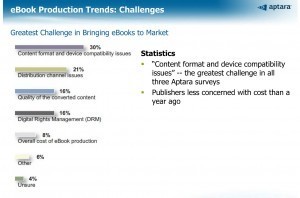 "Ebooks are the most dominant force in contemporary publishing. Their sales rose nearly 40 percent in 2010, and more than a third of book publishers (surveyed say) they will issue more than 75 percent of their titles as ebooks in 2011."
"Ebooks are the most dominant force in contemporary publishing. Their sales rose nearly 40 percent in 2010, and more than a third of book publishers (surveyed say) they will issue more than 75 percent of their titles as ebooks in 2011."
—Slideshare presentation from Eric Freese with Six Key Takeaways from Aptara's Third Annual Survey
"I am sorry there is no way to present this as anything other than confusing."
—Shoppin' Mike Shatzkin finds
The ebook marketplace could definitely confuse the average consumer
Wait a minute, Disney didn't make Avatar
"Call me a purist, but I have always found it a bit off-putting when Disney injects non-Disney material into the parks … I worry about this for Avatarland. Will the Na'vi interact with Mickey and friends? Will we see giant tanks rolling down the main streets of the Animal Kingdom? Perhaps most 'gasp-worthy,' will they turn the Tree of Life into the Tree of Souls?"
—Jordan Edwards opines in Avatarland: Disney's Checkmate?
Maybe the London rioters were Kindle readers
"The thugs in London and Birmingham didn't steal from the book shops for this reason: there was nothing in there they wanted."
—Colin Falconer 's admirable Bonnie Tyler moment:
Why Writers Write and Readers Read
Designers on the ether
"Perhaps the biggest challenge for American design is that design itself is a concept both murky and diffuse, two adjectives that don't coexist easily with American enthusiasm and impatience … It requires a certain fluidity and tolerance for change that can be hard to manage, especially in a corporate context. For maximum effectiveness, it needs to be part of a bigger system. Even then, it's maddeningly hard to measure."
—Linda Tischler at Fast Company on the The United States of Design
"MoMA's design curator is a quirky tastemaker and articulate advocate."
—Paola Antonelli's write-up as one of
Fast Company's America's 50 Most Influential Designers (infographic)
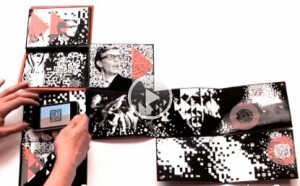
The Museum of Modern Art "Talk to Me" | image by Etienne Mineur
"This book allows a user to navigate a choose-your-own-adventure story through folding patterns that physically trace her journey and decisions. Near the end of any particular path, a smartphone and QR tag can be used to link to an online video segment that brings the story to an interactive conclusion."
—gallery text from Paola Antonelli's exhibition "Talk to Me" for
Etienne Mineur's
The Night of the Living Dead Pixels
"Designers today have to be a little bit script-writers."
—Paola Antonelli in her English-language streamed walk-through of Talk to Me
"An NYC members-only workspace … a think tank for any small businesses or individual looking for a beautiful, simple, and convenient place to work when paying for office space just isn't feasible."
—Brett Valls finds a well-designed answer to the question "where to write?" in
Grind: Revolutionary Workspace That Will Change Small Business As We Know It Forever
Bookmark it now, read it later
"She asked about (my) books, which she had read—which is more than I have."
—Philip Roth on interviewer Livia Manera, in Celestine Bohlen's
Rare Unfurling of the Reluctant Philip Roth
"My question to you, Jonathan: Is the capacity to act amid uncertainty "romantic?" Is it "poetic?" Does your philosophy see a connection between the pursuit of "beauty," as Keats phrased it, and contemporary entrepreneurial marketing/publishing/commerce?"
—Steven Pressfield the Resistance Slayer asks the right questions in
Jonathan Fields on Uncertainty
"My father was a fan. I hadn't known. Or if I'd known, I hadn't thought of it that way. Looking more closely at the files, I saw that they weren't comprehensive, that some sort of selection process was at work. It definitely wasn't what I would've picked for my career retrospective. I figured that his collection and curation of my work was his way of holding the person I'd become closer, to understand me better. I just sort of wish we'd talked to each other about it."
—John Warner discovers My Biggest Fan
"A DOG'S BREAKFAST IS TURKEY, MEATLOAF, PASTA, SALAD (he'd tick off a finger on his left hand to emphasize each foodstuff) WHATEVER'S LEFT IN THE ICEBOX! THIS GODDAMN NOVEL SOUNDS JUST LIKE THAT…SCIENCE FICTION AND FAMILY DRAMA WITH THE PROMISE OF THROUGHLINE CRIME SLOSHING AROUND WITH A REDEMPTIVE MATURATION PLOT! CHOOSE ONE GENRE AND DO IT WELL. DON'T PUBLISH WRTERS WHO DON'T CHOOSE!"
—Shawn Coyne recalls St. Martin's Press' Thomas McCormack in Glove Before Stick
How-to's of the week
"There are lots of different kinds of books, and we can point to a few clear reasons why some books sell better than others:
It has unique information that's in demand, but that cannot be found anywhere else
It solves a problem that many people have
The story is compelling and/or entertaining
The author is a celebrity
The book is already selling and people start telling others about the book"
—Joel Friedlander offers his lead article from CreateSpace,
Basics of Book Marketing for the Beginning Self-Publisher: Part 1, Part 2, and Part 3
"For months now I've been re-writing the line 'Submit personal essay.'"
—Patrick Ross asks Do You Suffer from "Not-Quite" Paralysis?
Madder men
"Remember when TV viewers were seen as passive consumers? The minimal effort required to operate a remote control (and open a beer and a bag of Cheetos) meant that sitting on the couch and taking in a few of your favorite shows made you a "couch potato." Funny how the addition of just another small device—the smartphone—to the mix has transformed the couch potato into a superfan/social-marketer/programmer with the power to transform TV."
—Simon Dumenco channel-surfs:
Seven Things You Need to Know About 'Social TV' Right Now
Smackdown among the MFA-ranking haters
"Columbia is … for people whose genitals still work, dammit. For writers who want to be brave and persevere in the real world where people often fail."
—Scott Kenemore defends his alma mater's family jewels in
Nice Try: Why the Poets & Writers MFA rankings are a sham
Every girl's crazy 'bout a sharp undressed man
"I saw something startlingly familiar: the Parke & Ronen men's swimwear show I'd attended a few nights earlier, but set in ancient Greece. What I was looking at were marble sculptures of kouroi, or youths, from around 600 B.C. They were all nude and all shared the same pose: standing upright, arms down, staring blankly ahead, with one foot slightly advanced, as if in forward stride. The pose, as I now knew, was standard on runways. So was the body type. And the blank beauty. The Parke & Ronen men looked like generic career hunks. The kouroi did, too; so generic, in fact, that they seemed barely human. "
—Critic Holland Cotter toughs it out at Fashion Week: Male Models at the Line of Beauty
Porter Anderson
is a Fellow with the National Critics Institute, and a senior producer and consultant formerly with the
United Nations World Food Programme
in Rome and
INDEX: Design to Improve Life
in Copenhagen. As a journalist, he has worked with media including CNN, the Village Voice, and the Dallas Times Herald. He's based in Tampa.

September 21, 2011
A Hidden Aspect of Creative Life That Underpins Great Work
The following is excerpted from Uncertainty: Turning Fear and Doubt Into Fuel for Brilliance by Jonathan Fields.
Uncertainty and fear of judgment go hand in hand. The more you lean into uncertainty and the greater the risks you take to create something that didn't exist before, the greater will be the potential for you to be judged and criticized. The judgment is all wrapped around two big questions that all creators constantly wrestle with:
(1) Is this good enough?
(2) Am I good enough?
We are often terrified of getting answers to those questions we don't want to hear. This aversion to being judged, to being told something doesn't measure up, leads you to cut creative quests short or, worse, never even begin.
That alone is a tough enough challenge for the creative soul who typically spends a good chunk of time pining for acceptance.
What if you lust after the quest to create but have not yet discovered how to lean into the fear? Can you teach yourself to be a fear alchemist and, in doing so, develop the ability to tap into the fuel side of fear to create on a whole different level?
Yes. There are practices and changes in your environment and process that can help. One of them I call certainty anchors.
A certainty anchor is a practice or process that adds something known and reliable to your life when you may otherwise feel you're spinning off in a million different directions. Rituals and routines can function as certainty anchors; their power comes from the simple fact that they are always there. They are grounding experiences to which you can always return, no matter what's going on. Their consistency makes them effective tools to counter the anxiety that comes not only from living in uncertain times, but from embracing endeavors that ramp uncertainty even higher.
For the creator, whose very existence depends on the ability to spend vast amounts of time living and operating in the ethereal sea of uncertainty and anxiety that is creation, rituals in every part of life serve as a source of psychic bedrock. They provide just enough of a foundation to allow you to free up that part of your brain that needs permission to run unencumbered in the quest to create the greatest possible something from nothing.
Some of the most creative people in the world are attached to rituals and routines in their everyday lives. Professional blogger Darren Rowse starts each day by heading off to his favorite cafe, ostensibly to find a good place to write, but there's a lot of ritual in that as well.
In her classic book The Creative Habit, legendary choreographer Twyla Tharp shares how she would awaken at 5:30 a.m. every day, take a taxi to the gym, work out with the same trainer, shower, eat three hard-boiled egg whites and coffee, make calls for one hour, work in her studio for two hours, rehearse with her company, return home for dinner, read for a few hours, then go to bed. Every day, the same routine. "A dancer's life," she said, "is all about repetition."
Broader lifestyle routines serve as a salve to calm a bit of the anxiety of creation and to drop an anchor to which we can tether our creative lines, knowing we can float higher up into the clouds and stay there longer, trusting that we'll be able to find our way down.
 Jonathan Fields is a lawyer-turned-serial-entrepreneur, acclaimed blogger, business consultant, speaker, and author. His last book, Career Renegade, was named a Top 10 Small Biz Book by Small Business Trends. He writes about entrepreneurship, innovation, lifestyles, and marketing at JonathanFields.com and TribalAuthor.com and contributes to PsychologyToday.com and OPENForum.com. To learn more about how to turn fear and doubt into fuel for brilliance, check out Jonathan's new book, Uncertainty.
Jonathan Fields is a lawyer-turned-serial-entrepreneur, acclaimed blogger, business consultant, speaker, and author. His last book, Career Renegade, was named a Top 10 Small Biz Book by Small Business Trends. He writes about entrepreneurship, innovation, lifestyles, and marketing at JonathanFields.com and TribalAuthor.com and contributes to PsychologyToday.com and OPENForum.com. To learn more about how to turn fear and doubt into fuel for brilliance, check out Jonathan's new book, Uncertainty.

September 20, 2011
Don't Write a Memoir to Get Revenge
The following is excerpted from The Memoir Project: A Thoroughly Non-Standardized Text for Writing & Life by Marion Roach Smith.
It would be impossible to count up just how many people over the years have come into my class hell-bent on writing a revenge tale. So here's some hard-won advice:
Never write a story because you want to exact revenge or betray someone.
Your story can be about revenge, absolutely, but the story itself should not be wielded as a blunt object, a cat-o'-nine-tails, or a bludgeon.
Instead, while writing about the hideous aspects of life, you should attempt to teach us something about the behavior of those involved, about your behavior, about all human behavior. Let us into your story by shedding light on our own dilemmas, fears, happiness, or wide-eyed wonder.
Pretty big requirement, isn't it?
It should be, or else all memoir would be sniveling, and I'm really interested in someone else's sniveling only if it somehow elevates my own. So remember, just like doctors do, "First, do no harm," and don't get suckered into a revenge-to-nowhere tale, where you ask forever how you can get back at someone without ever quite doing so.
Asking the question "What is it about?" will prevent that kind of useless exercise. Ask that, and while the answer might be, "revenge," you will end up writing a piece on how you tried to get some, what you learned along the way, or how you plotted and plotted and where that led you.
Writing a tale that seeks revenge, you'll quickly see that tale as merely a list of hurts, which, when you get to the end of that list, is a list that may not interest even you anymore. Revenge as a topic is good; as an intent, it's not. This is another benefit to writing with intent, instead of writing for exercise.
Not to go all bumper sticker on you, but learn to write with intent and you might learn something about life—as you will when you learn to reduce the essence of the piece to a single totemic emotion such as "pity" or "joy," a single experience such as "freedom" or "redemption," or even a single phrase such as "the dramatic story of a family's struggle with Alzheimer's disease."
That may take some time. But you can do this now: You can decide on a genre—humor, perhaps—and choose how to illustrate it.
Here's how you do it. Say aloud to yourself, "This is a piece of humor, and the illustration is that day at the proctologist," or "This is a tragedy, and the illustration is finding those Polaroids," or "This is about how anger withers the soul, and the illustration is my uncle Henry's struggle for revenge."
What will not work is the phrase "This is a tragedy and the illustration is my marriage." This is too big. On the enormous topic of your marriage, look instead for the moment it shifted—the discovery of the Polaroids that revealed where it is your spouse would rather be; the first time your wife didn't get choked up at someone else's wedding; alone, trying to snap the safety clasp of your bracelet after the death of your partner—and we will see the tragedy. Capture the moment of "aha!" and you'll find one specific story that you can drive forward.
Do you see what is happening here? You are shifting yourself—your story—into a new position of importance, where you are no longer the center of the tale. Repeat: I am not the story. Exactly. You are the illustration. You are the picture in the frame, the lozenge in the wrapper. Get that, and when you do, you will see how your story—the illustration of the theme—gets shifted to the second phrase of this sentence and, by extension, to its proper place.
Marion Roach Smith has taught a sold-out class called "Writing What You Know" since 1998. She is a graduate of St. Lawrence University and the author of The Roots of Desire and Another Name for Madness. A former staff member of the New York Times and a contributor to NPR's All Things Considered, she writes and records daily and weekly spots on Martha Stewart Living Radio.

Jane Friedman
- Jane Friedman's profile
- 1882 followers


